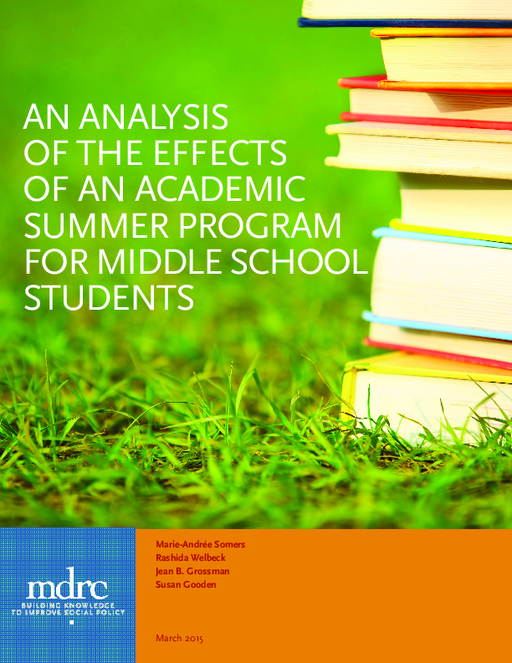Breadcrumb
- Wallace
- Reports
- An Analysis Of The Effects Of An...
An Analysis of the Effects of an Academic Summer Program for Middle School Students

- Author(s)
- Marie-Andrée Somers, Rashida Welbeck, Jean B. Grossman, and Susan Gooden
- Publisher(s)
- MDRC
Summary
How we did this
Researchers examined the impact of BELL’s middle school summer learning model in three school districts. They used a random assignment research design, the most rigorous type of design for evaluating program effects.
Most research studying the impact of summer learning programming focuses on younger students. This report takes a different approach. It examines the impact of summer learning programs on middle school students in three sites run by the BELL (Building Educated Leaders for Life) organization.
Key Findings
The five-week remedial programs provided morning academics and afternoon enrichment for children in grades six through eight. Many students were low academic performers and most were from low-income families.
Researchers found that:
- Students attended at high rates, even though enrollment was not mandatory.
- Programs were well run and well staffed.
- Participation did not prevent students from doing other, “fun” summer activities, like playing sports or watching TV. Nor did it make them less engaged in their schoolwork when they returned to school in the fall.
- Programs substantially increased the amount of academic instruction received by students — in BELL’s case, about 18 extra hours per subject area.
Student Achievement
The findings provide preliminary evidence that the programs had positive effects on middle school students’ math achievement. Improving reading achievement was more challenging, because it was harder to keep students in this age group engaged.
The report suggests that strategies for teaching reading skills to middle school students may need to be different from the approaches used with elementary school students. For instance, the content of reading materials may need to be tailored to the needs and interests of youth.
Preliminary Evidence
The research involved randomized controlled trials, the most rigorous approach. But it also recruited too few students to result in an investigation with sufficient statistical “power.” As a result, the study’s findings are not definitive, researchers concluded.
At the same time, the research offers preliminary evidence about potential effects of middle school summer programs and for understanding the environment in which such programs operate.
Related reports on academic summer programs are:
Key Takeaways
- Researchers studied the impact of summer learning programs on middle school students in three sites run by the BELL (Building Educated Leaders for Life) organization.
- Programs increased the amount of academic instruction received by students.
- Participation did not prevent students from doing other, “fun” summer activities.
- The findings provide preliminary evidence that the programs had positive effects on middle school students’ math achievement.

Numerous studies have shown that students’ success in grades 6 to 8 has profound implications for their future.
What We Don't Know
- Are the findings representative of the effect of BELL’s program in districts that have more experience with it or in districts where student participation is mandatory?
- How did later changes to the curricula and staff training affect results?

